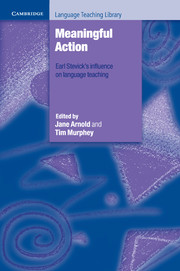Book contents
- Frontmatter
- Contents
- List of contributors
- Acknowledgements
- Preface
- Introduction
- Part A Meaning-making inside and between the people in the classroom
- Part B Meaningful classroom activity
- Part C Frameworks for meaningful language learning
- Epilogue: A way with words – perspectives on the contributions and influence of Earl W. Stevick
- Appendix: Words of tribute to Earl Stevick
- Index
13 - The Inner Workbench: learning itself as a meaningful activity
Published online by Cambridge University Press: 15 November 2023
- Frontmatter
- Contents
- List of contributors
- Acknowledgements
- Preface
- Introduction
- Part A Meaning-making inside and between the people in the classroom
- Part B Meaningful classroom activity
- Part C Frameworks for meaningful language learning
- Epilogue: A way with words – perspectives on the contributions and influence of Earl W. Stevick
- Appendix: Words of tribute to Earl Stevick
- Index
Summary
Introduction
The 1970s and 1980s were, for me in the UK, a time of professional excitement in the ELT world. I found myself teaching in a milieu in which my colleagues and I explored, discussed and adapted the educational and psychological theories and practices of learning and teaching around at the time, exchanging experiences and pushing our own boundaries. This formative time was rich in influences that shaped my experience and the development of my values and assumptions, which affect what I notice, how I respond, what I write about and how I write. I will start by identifying some of the assumptions or biases that I hold, that may colour what I say in this chapter:
• Learning itself is engaging and personally meaningful. In fact humans are designed for learning, we are learning beings. I value activities that uphold this.
• The meaning experienced in the activity of learning is different from, though not unconnected to, the significance that the content of the learning may have for the learner.
• Part of the meaning I experience in the activity of learning is that it seems to allow me the feeling of being more myself, almost as if I am coming home to something. I can imagine that this relates to the innate biological urge to learn, and I can imagine that it relates to a purposeful sense of using myself, or even ‘making myself’, but this is imagination and I do not wish to take it further here, except to say that I think I recognize this in others when they are learning, especially my students, and furthermore my own experience of learning can be enhanced when in the company of others who are similarly engaged, as in my classroom.
• There is something about engaged learning that is contagious (Gattegno, personal communication). Thus if you want learning, show learning. I feel that my students’ learning is in some way dependent on my own learning at the same time in the same room, so that a core part of my job as teacher/facilitator is to serve the learning of the learner by creating the conditions for their engagement to emerge, for their curiosity to fire up, which necessitates my own learning in the same moment.
- Type
- Chapter
- Information
- Meaningful ActionEarl Stevick's Influence on Language Teaching, pp. 202 - 218Publisher: Cambridge University PressPrint publication year: 2013
- 1
- Cited by



